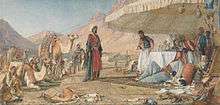Frederick Stewart, 4th Marquess of Londonderry
| The Most Honourable The Marquess of Londonderry KP PC | |
|---|---|
%2C_Viscount_Castlereagh_(1822-1854)%2C_by_Simon_Jacques_Rochard.jpg) Frederick William Robert Stewart, 4th Marquess of Londonderry KP, PC (1805 – 1872), Viscount Castlereagh (1822-1854) (Simon Jacques Rochard, 1833) | |
| Vice-Chamberlain of the Household | |
|
In office 29 December 1834 – 8 April 1835 | |
| Monarch | William IV |
| Prime Minister | Sir Robert Peel, Bt |
| Preceded by | The Earl of Belfast |
| Succeeded by | Lord Charles FitzRoy |
| Personal details | |
| Born |
7 July 1805 Grosvenor Square, Mayfair, London |
| Died |
25 November 1872 (aged 67) White Rock Pavilion, Hastings, Sussex |
| Nationality | British |
| Political party | Tory |
| Spouse(s) |
Lady Elizabeth Jocelyn (1813–1884) |
Frederick William Robert Stewart, 4th Marquess of Londonderry KP PC (7 July 1805 – 25 November 1872), styled Viscount Castlereagh between 1822 and 1854, was a British nobleman and Tory politician. He was briefly Vice-Chamberlain of the Household under Sir Robert Peel between December 1834 and April 1835.
Background and education
Stewart was born at Grosvenor Square, Mayfair, London, the eldest son of Charles Stewart, 3rd Marquess of Londonderry, by his first wife Lady Catherine Bligh, daughter of John Bligh, 3rd Earl of Darnley. His mother died when he was seven and while his father was serving in the army overseas, Stewart was looked after by his uncle and aunt, Lord and Lady Castlereagh. He went to Eton in 1814, where he stayed until 1820. After his father succeeded to the marquessate of Londonderry in 1822, Stewart became known by the courtesy title Viscount Castlereagh.
Political career
Lord Castlereagh sat as Member of Parliament for County Down from 1826 to 1852.[1] He served under the Duke of Wellington as a Lord of the Admiralty from 1828 to 1830 and under Sir Robert Peel as Vice-Chamberlain of the Household from December 1834[2] to April 1835. On 23 February 1835 he was sworn of the Privy Council.[3] He was one of the Members of Parliament for County Down from 1826 until 1852. By the latter year, he "had fallen out with his father, the Marquess of Londonderry over their views on the land question [and] was obliged to retire because of these differences".[4] From 1845 until 1864 he was Lord Lieutenant of Down. In 1856 he was made a Knight of the Order of St Patrick.
Personal life

Lord Londonderry married Lady Elizabeth Frances Charlotte Jocelyn, widow of Viscount Powerscourt and daughter of Robert Jocelyn, 3rd Earl of Roden, at the British Embassy in Paris on 2 May 1846. There were no children from the marriage. He died at the White Rock Pavilion (this was almost certainly White Rock Villa as the White Rock Pavilion, now called the White Rock Theatre, wasn't built until 1927) in Hastings in November 1872, aged 67, and was succeeded in the marquessate by his half-brother, George Vane-Tempest, 2nd Earl Vane. The Marchioness of Londonderry died on 2 September 1884, aged 70, and was buried with him in Newtownards.
Ancestry
| Ancestors of Frederick Stewart, 4th Marquess of Londonderry | |||||||||||||||||||||||||||||||||||||||||||||||||||||||||||||||||||||||||||||||||||||||||||||||||||||||||||||||||||||||||||||||||||||||||||||||||||||||||||||||||||||||||||||||||||||||||||||||||||||||||||||||||||||||||||||||||||||||||||||||||||||||||||||||||||||||||||||||||||||||||||||||||||||||||||||||||||||||||||||||||||||||||||||||||||||||||||||||||||||||||||||||||||||||||||||||||||||||||||||||||||||||||||||||||||||||||||||||||||||||||||||||||||||||||||
|---|---|---|---|---|---|---|---|---|---|---|---|---|---|---|---|---|---|---|---|---|---|---|---|---|---|---|---|---|---|---|---|---|---|---|---|---|---|---|---|---|---|---|---|---|---|---|---|---|---|---|---|---|---|---|---|---|---|---|---|---|---|---|---|---|---|---|---|---|---|---|---|---|---|---|---|---|---|---|---|---|---|---|---|---|---|---|---|---|---|---|---|---|---|---|---|---|---|---|---|---|---|---|---|---|---|---|---|---|---|---|---|---|---|---|---|---|---|---|---|---|---|---|---|---|---|---|---|---|---|---|---|---|---|---|---|---|---|---|---|---|---|---|---|---|---|---|---|---|---|---|---|---|---|---|---|---|---|---|---|---|---|---|---|---|---|---|---|---|---|---|---|---|---|---|---|---|---|---|---|---|---|---|---|---|---|---|---|---|---|---|---|---|---|---|---|---|---|---|---|---|---|---|---|---|---|---|---|---|---|---|---|---|---|---|---|---|---|---|---|---|---|---|---|---|---|---|---|---|---|---|---|---|---|---|---|---|---|---|---|---|---|---|---|---|---|---|---|---|---|---|---|---|---|---|---|---|---|---|---|---|---|---|---|---|---|---|---|---|---|---|---|---|---|---|---|---|---|---|---|---|---|---|---|---|---|---|---|---|---|---|---|---|---|---|---|---|---|---|---|---|---|---|---|---|---|---|---|---|---|---|---|---|---|---|---|---|---|---|---|---|---|---|---|---|---|---|---|---|---|---|---|---|---|---|---|---|---|---|---|---|---|---|---|---|---|---|---|---|---|---|---|---|---|---|---|---|---|---|---|---|---|---|---|---|---|---|---|---|---|---|---|---|---|---|---|---|---|---|---|---|---|---|---|---|---|---|---|---|---|---|---|---|---|---|---|---|---|---|---|---|---|---|---|---|---|---|---|---|---|---|---|---|---|---|---|---|---|---|---|---|---|---|---|---|---|---|---|---|---|---|---|---|---|---|---|---|---|---|---|---|---|---|---|---|---|---|---|---|---|---|---|---|---|---|---|---|---|---|---|
| |||||||||||||||||||||||||||||||||||||||||||||||||||||||||||||||||||||||||||||||||||||||||||||||||||||||||||||||||||||||||||||||||||||||||||||||||||||||||||||||||||||||||||||||||||||||||||||||||||||||||||||||||||||||||||||||||||||||||||||||||||||||||||||||||||||||||||||||||||||||||||||||||||||||||||||||||||||||||||||||||||||||||||||||||||||||||||||||||||||||||||||||||||||||||||||||||||||||||||||||||||||||||||||||||||||||||||||||||||||||||||||||||||||||||||
References
- ↑ Leigh Rayment's Historical List of MPs – Constituencies beginning with "D" (part 3)
- ↑ The London Gazette: no. 19225. p. 2348. 30 December 1834.
- ↑ The London Gazette: no. 19243. p. 334. 24 February 1835.
- ↑ Brian Walker, 'Landowners and Parliamentary Elections in County Down, 1801–1921' PP 307–8 in Lindsay Proudfoot, 'Down – History and Society', Geography Publications, 1997
External links
- Hansard 1803–2005: contributions in Parliament by the Marquess of Londonderry
| Parliament of the United Kingdom | ||
|---|---|---|
| Preceded by Lord Arthur Hill Mathew Forde |
Member of Parliament for Down 1826–1852 With: Lord Arthur Hill 1826–36 Earl of Hillsborough 1836–45 Lord Edwin Hill 1845–52 |
Succeeded by Lord Edwin Hill David Stewart Ker |
| Political offices | ||
| Preceded by The Earl of Belfast |
Vice-Chamberlain of the Household 1834–1835 |
Succeeded by Lord Charles FitzRoy |
| Honorary titles | ||
| Preceded by The Marquess of Downshire |
Lord Lieutenant of Down 1845–1864 |
Succeeded by The Lord Dufferin and Claneboye |
| Peerage of Ireland | ||
| Preceded by Charles William Vane |
Marquess of Londonderry 1854–1872 |
Succeeded by George Vane-Tempest |